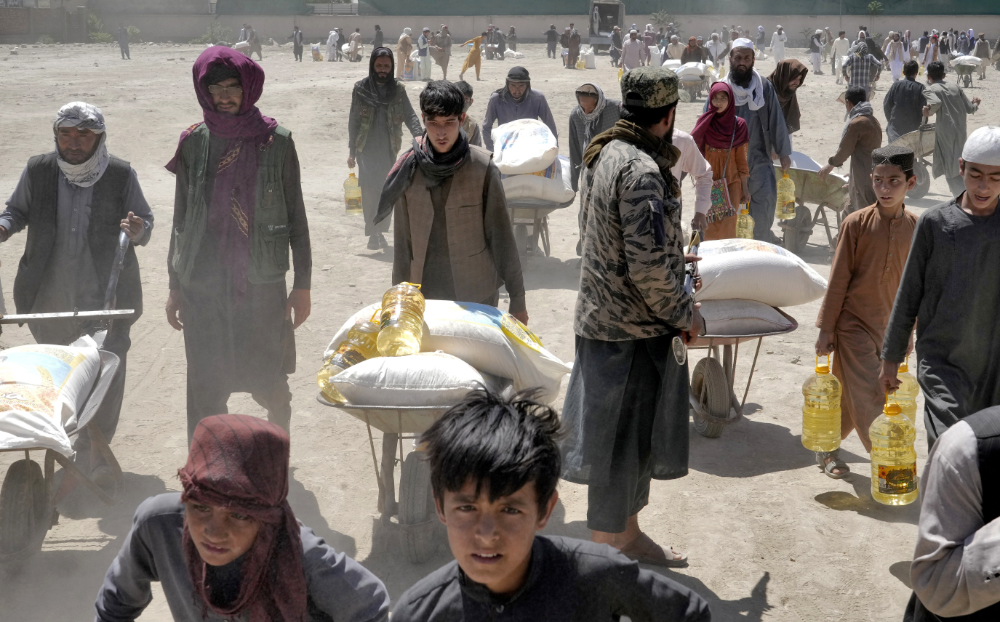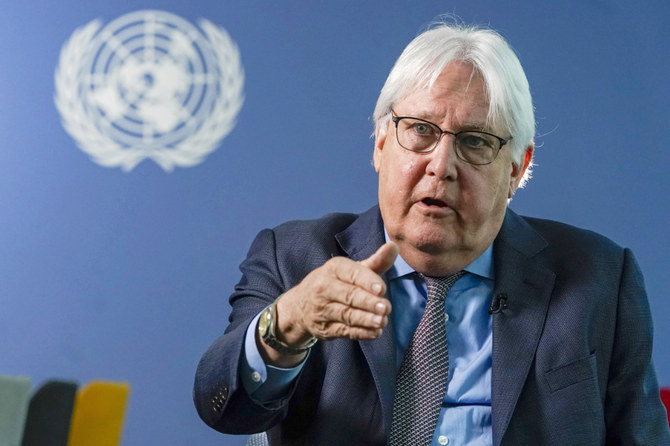UNITED NATIONS: Warning that Afghanistan faces deepening poverty with 6 million people at risk of famine, the UN humanitarian chief on Monday urged donors to restore funding for economic development and immediately provide $770 million to help Afghans get through the winter as the United States argued with Russia and China over who should pay.
Martin Griffiths told the UN Security Council that Afghanistan faces multiple crises — humanitarian, economic, climate, hunger and financial.
Conflict, poverty, climate shocks and food insecurity “have long been a sad reality” in Afghanistan, but he said what makes the current situation “so critical” is the halt to large-scale development aid since the Taliban takeover a year ago.

A Taliban fighter stands guard as people receive food rations distributed by a Chinese humanitarian aid group, in Kabul, Afghanistan, Saturday, April 30, 2022. (AP)
More than half the Afghan population — some 24 million people — need assistance and close to 19 million are facing acute levels of food insecurity, Griffiths said. And “we worry” that the figures will soon become worse because winter weather will send already high fuel and food prices skyrocketing.
Despite the challenges, he said UN agencies and their NGO partners have mounted “an unprecedented response” over the past year, reaching almost 23 million people.
But he said $614 million is urgently required to prepare for winter including repairing and upgrading shelters and providing warm clothes and blankets — and an additional $154 million is needed to preposition food and other supplies before the weather cuts access to certain areas.
Griffiths stressed, however, that “humanitarian aid will never be able to replace the provision of system-wide services to 40 million people across the country.”
The Taliban “have no budget to invest in their own future,” he said, and “it’s clear that some development support needs to be started.”
With more than 70 percent of Afghan’s living in rural areas, Griffiths warned that if agriculture and livestock production aren’t protected “millions of lives and livelihoods will be risked, and the country’s capacity to produce food imperiled.”
He said the country’s banking and liquidity crisis, and the extreme difficulty of international financial transactions must also be tackled.
“The consequences of inaction on both the humanitarian and development fronts will be catastrophic and difficult to reverse,” Griffiths warned.
Russia called the UN Security Council meeting on the eve of the first anniversary of the US withdrawal from Afghanistan and its ambassador, Vassily Nebenzia, sharply criticized the “ignominious 20-year campaign” by the United States and its NATO allies.
He claimed they did nothing to build up the Afghan economy and their presence only strengthened the country’s status “as a hotbed of terrorism” and narcotics production and distribution.
Nebenzia also accused the US and its allies of abandoning Afghans to face “ruin, poverty, terrorism, hunger and other challenges.”
“Instead of acknowledging their own mistakes and supporting the reconstruction of the destroyed country,” he said, they blocked Afghan financial resources and disconnected its central bank from SWIFT, the dominant system for global financial transactions.
China’s UN Ambassador Zhang Jun also accused the US and its allies of “evading responsibility and abandoning the Afghan people” by cutting off development aid, freezing Afghan assets and imposing “political isolation and blockade.”
US Ambassador Linda Thomas-Greenfield accused the Taliban of imposing policies that “repress and starve the Afghan people instead of protecting them” and of increasing taxes on critically needed assistance.
She asked how the Taliban — which has not be recognized by a single country — expect to build a relationship with the rest of the world when it provided a safe haven for the leader of Al-Qaeda, Ayman Al-Zawahiri, in downtown Kabul. He was killed by a US drone strike on July 31.
Nonetheless, Thomas-Greenfield said, the United States is the world’s leading donor in Afghanistan, providing more than $775 million in humanitarian aid to Afghans in the country and the region in the last year.
As for Afghan frozen assets, President Joe Biden announced in February that the $7 billion in the US was being divided — $3.5 billion for a UN trust fund to provide aid to Afghans and $3.5 billion for families of American victims of the 9/11 terror attacks in the United States.
“No country that is serious about containing terrorism in Afghanistan would advocate to give the Taliban instantaneous, unconditional access to billions in assets that belong to the Afghan people,” Thomas-Greenfield said.
To Russia’s claims that Afghanistan’s problems are the fault of the West and not the Taliban, Thomas-Greenfield asked, “What are you doing to help other than rehash the past and criticize others?”
She said Russia has contributed only $2 million to the UN humanitarian appeal for Afghanistan and China’s contributions “have been similarly underwhelming.”
“If you want to talk about how Afghanistan needs help, that’s fine. But we humbly suggest you put your money where your mouth is,” Thomas-Greenfield said.
Russia’s Nebenzia took the floor again, calling the suggestion “stunning.”
“We are being asked to pay for the reconstruction of a country whose economy was essentially destroyed by 20 years of US and NATO occupation?” he asked. “You are the ones who need to pay for your mistakes. But first of all, you need to return to the Afghan people the money that has been stolen from them.”
Thomas-Greenfield, the US ambassador, had the last word.
“If the Russian Federation believes that there was an economy in Afghanistan to be destroyed, it’s been destroyed by the Taliban,” she said.


























